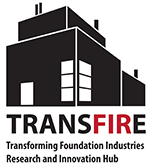In the summer of last year, a range of teams from across TransFIRe began working with Zentia, a ceiling tile manufacturer in Gateshead, to develop a case study focused on reducing energy usage, capturing and reusing waste heat and exploring the use of additives and alternative product mixtures to improve the material properties of their products.
Zentia’s factory produces ceiling tiles formed from a wet mixture of newsprint, starch, fibreglass and other minerals, which are then pressed and dried by passing through a long series of gas-fired ovens. The manufacturing process generates large amounts of steam and hot air and offers significant potential for heat and water recovery projects.
Initially brought into the TransFIRe programme by Professor Justin Perry and Dr Matt Unthank, Chemical Technical Working Group members from Northumbria University, to explore the use of alternative tile coatings, the engineering and management team at Zentia also expressed interest in upgrading their existing oven dryer system to be more energy efficient and either reducing or making better use of the large volumes of steam and hot air that is currently vented to the atmosphere.
Given the potential for heat capture, members of the Work Stream 3 (WS3) team, Professor Steve Yearley and Dr Kyle Parker from the University of Edinburgh and Dr Steve Cinderby and Dr Jean McKendree from the University of York, were also brought on board to look at the possible ways this energy could be used for the benefit of the surrounding businesses and wider community.
In addition, the WS3 team led several ‘User Journey’ exercises to help Zentia’s engineering and management team explore the range of transformative options available, as well as the potential challenges, barriers, solutions and outcomes of any proposed change to their manufacturing process or business model.
As a result of these User Journey exercises, Zentia was able to identify several high-priority aspects of their current operation that they wanted to transform, as well as a number of possible technical solutions that they were interested in pursuing in the short- to medium-term.
Thus, the next phase of this case study, spearheaded by Work Stream 1 (WS1) and our Paper Technical Working Group, will focus on assisting with the delivery of these technical outcomes. To that end, Dr Simon Curling of Bangor University plans to work with the engineering team at Zentia to perform materials properties tests on the company’s product mixture, with the aim of better understanding how to reduce water content as well as operational losses during tile-making. In a similar vein, Dr Natanael Bolson, University of Cambridge and colleagues propose to conduct lifecycle analyses and energy audits of Zentia’s manufacturing process, to help identify ways to improve efficiency and reduce overall energy costs.
The work with Zentia has confirmed the importance for TransFIRe of working as a hub, bringing in diverse technical expertise together with business analysis and qualitative approaches to deliberation on policy alternatives.

